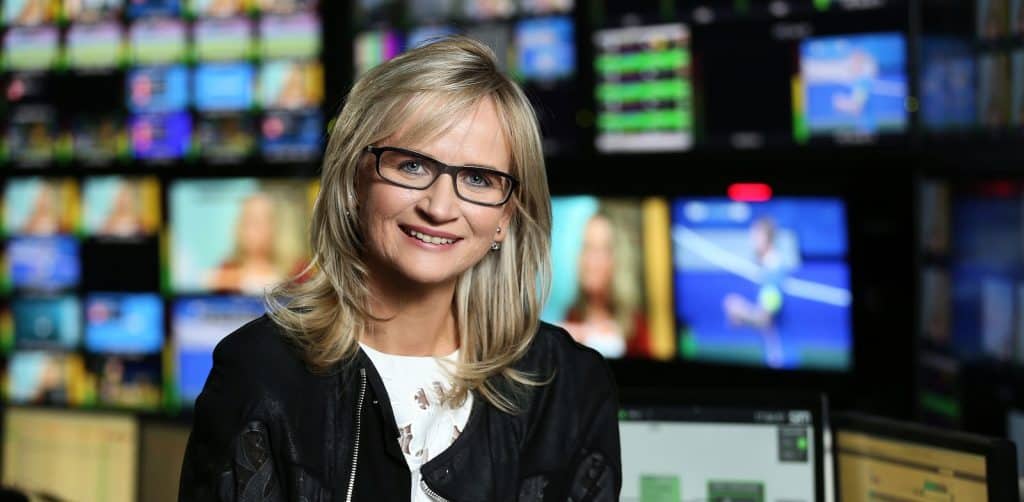“2020 clarified and empowered the unique role of public media.” – Dee Forbes, Director General, RTÉ
Dee Forbes is Director General of RTÉ
This article was originally published in the cover story of Business & Finance magazine, vol. 58, no. 1. It is available to read in our archive, here.
It was Lincoln who said that the best way to predict the future is to create it. The observation is a compelling one as we leave behind a year that touched everyone, every community, sector and business.
But as we (gladly) leave 2020 behind, it’s crucial that we take some of it with us.
In 2020 we learned about resilience – personal and economic, social and cultural. We reached deeper into our creative selves, and we innovated in tighter time frames, and under greater pressure, than ever before. Everything pivoted in 2020; from cultural bodies to SMEs to large corporations, the modes of production and delivery of product and services to consumers was revolutionised at a pace and volume we have never witnessed before. And we, the people, followed, embracing flexibility, harnessing the energy of a crisis to come together.
This mass coming together has within it a blueprint for the type of future we can now set out to create in 2021, and beyond.
Certain productions had to be suspended, or stepped down, due to public health restrictions. But new and exciting programming – such as Home School Hub and Ireland on Call – were commissioned in their place, often within exceptionally tight deadlines.
Covid-19 has had a huge impact on the media sector generally, not least on public media. At the start of this pandemic our focus was simply staying on air, or remaining in print. But the media in Ireland went far beyond this initial ambition to deliver for the people of Ireland, dayin, day-out. Despite the logistical, financial, and human challenges of the early stages of the pandemic, Ireland’s media, both local and national, played a critical and leading role in keeping people in Ireland informed, engaged, and safe.
2020 clarified and empowered the unique role of public media. In the most recent Behaviours and Attitudes research, 90% of people indicated that they turn to RTÉ for information, while a further 76% said that they would trust RTÉ above all else.
2020 clarified, too, the purpose of public media. RTÉ maintained full schedules across all services, augmenting where appropriate with additional live broadcasts and brand-new programmes. Certain productions had to be suspended, or stepped down, due to public health restrictions. But new and exciting programming – such as Home School Hub and Ireland on Call – were commissioned in their place, often within exceptionally tight deadlines. This level of resilience, and this level of output under such challenging circumstances, was not easy. But, thanks to the flexibility of staff as well as our partners in the independent sector, the service to the people of Ireland was not only upheld, but excelled.
2020 showed us the importance of companionship, diversion and connection. People turned to story in all its forms, from documentaries, to drama and comedy, to investigative journalism, and the nation joined together in helping us to bring light to darker days, with events such as RTÉ Shine a Light and RTÉ Does Comic Relief.
2020 showed us the importance of companionship, diversion and connection. People turned to story in all its forms, from documentaries, to drama and comedy, to investigative journalism, and the nation joined together in helping us to bring light to darker days, with events such as RTÉ Shine a Light and RTÉ Does Comic Relief. Together, RTÉ and the people of Ireland almost €20 million for charity. A guiding principle through all of RTÉ’s commissioning decisions in 2020 was empathy. From the Illuminations art project to the epic Late Late Toy Show, empathy and connection were both the drivers and the outcomes – I believe that businesses will focus more carefully on the role of solidarity in daily life, for their employees, and for their customers and audiences.
2020 changed how we live, but also how we work. In 2021, remote working will shift from experiment to norm. And 2020, without a doubt, democratised our digital world at a pace we have not seen before. We need to be alert to how this has impacted how we consume – we are smarter, perhaps more impatient, and convenience is more essential than ever. 2020 should and will inform the digital strategies of 2021. We have lived through the greatest realtime consumer experience test in living memory.
For 2021, my hope is that the things we learned about ourselves, about our communities, and about our businesses, will be the seeds that allow us to flourish in a new year of hope. For RTÉ, the achievements of 2020 will fuel the drive ensure that the funding of public media is put on a firm footing. Future generations deserve a strong, independent Irish voice.
2020 showed us what we can do in a crisis. 2021 will show us what we learned from it.

